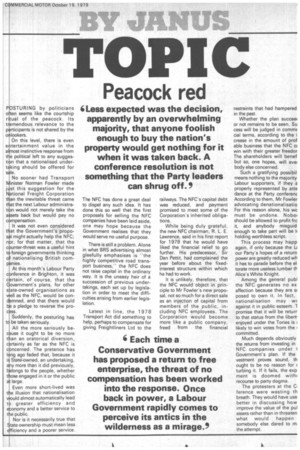TOP C
Page 75

If you've noticed an error in this article please click here to report it so we can fix it.
Peacock red
P STU R I NG by politicians
o en seems like the courtship ri ual of the peacock. Its t mendous relevance to the p rticipants is not shared by the
o lookers.
On this level, there is even
e tertainment value in the a ost instinctive response from t e political left to any suggest' n that a nationalised undert king should be offered for S. le.
No sooner had Transport mister Norman Fowler made st this suggestion for the
ational Freight Corporation t an the inevitable threat came t at the next Labour administrati n would not merely take the a sets back but would pay no
• mpensation.
It was not even considered t at the Government's propo
s I might actually help the NFC;
n r, for that matter, that the c unter-threat was a useful hint t foreign governments thinking
o nationalising British cornflies.
At this month's Labour Party c nference in Brighton, it was c rtain; of course, that the overnment's plans, for other s ate-owned organisations as well as the NFC, would be conrnned, and that there would a pledge to reverse the process.
Suddenly, the posturing has be taken seriously.
All the more seriously be e use it ought to be no more than an oratorical diversion, certainly as far as the NFC is concerned. The pretence has long ago faded that, because it i State-owned, an undertaking, any more than it did previously, longs to the people, whether those engaged in it or the public at large.
Even more short-lived was the illusion that nationalisation would almost automatically lead to greater efficiency and economy and a better service to the public.
Nor is it necessarily true that State ownership must mean less dfficiency and a poorer service. The NFC has done a great deal to dispel any such idea. It has done this so well that the first proposals for selling the NFC companies have been laid aside, one may hope because the Government realises that they would serve no useful purpose.
There is still a problem. Alone in what BRS advertising almost gleefully emphasises is "the highly competitive road transport business," the NFC does not raise capital in the ordinary way. It is the uneasy heir of a succession of previous undertakings, each set up by legislation in order.to meet the difficulties arising from earlier legislation.
Latest in line, the 1978 Transport Act did something to help, perhaps to compensate for giving Freightliners Ltd to the railways. The NFC's capital debt was reduced, and payment promised to meet some of the Corporation's inherited obligations.
While being duly grateful, the new NFC chairman, R. L. E. Lawrence, said in his first report for 1978 that he would have liked the financial relief to go further. His predecessor, Sir Dan Pettit, had complained the year before about the fixedinterest structure within which he had to work.
It is unlikely, therefore, that the NFC would object in principle to Mr Fowler's new proposal, not so much for a direct sale as an injection of capital from members of the public, including NFC employees. The Corporation would become more like a public company, freed from the financial restraints that had hampered in the past.
Whether the plan succees or not remains to be seen. Su cess will be judged in cornmE cial terms, according to the i crease in the amount of prof able business that the NFC win with their greater freedor The shareholders will benef but so, one hopes, will evei body else concerned.
Such a gratifying possibil means nothing to the majority Labour supporters, if they a properly represented by atte dance at the Party conferenc According to them, Mr Fowler advocating denationalisatio For this reason alone, his we must be undone. Noboi should be allowed to profit frc it, and anybody misguid. enough to take part will be Ii holding worthless script.
This process may happ again, if only because the Li. our Party's hopes of .a return power are greatly reduced wh it has to parade before the el torate more useless lumber th Alice's White Knight.
Among the general publ the NFC generates no ex. affection because they are st posed to own it. In fact, nationalisation may vvE against it in public esteem. 1 promise that it will be returr to that status from the libert enjoyed under the Tories is likely to win votes from the I committed.
Much depends obviously the returns from investing in NFC companies under 1 Government's plan. It the vestment proves sound, th ought to be no reason for turbing it. If it fails, the exp ment is doomed withc recourse to party dogma.
The protesters at the C. ference were wasting th breath. They would have use better in discussing how improve the value of the pul assets rather than in threaten what would happen somebody else dared to rn. the attempt.












































































































































